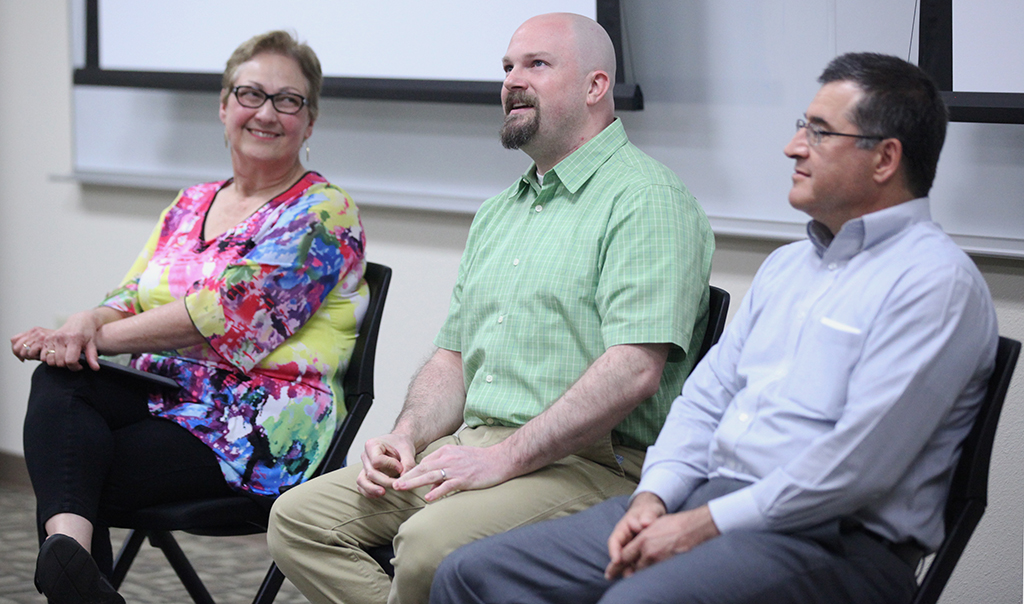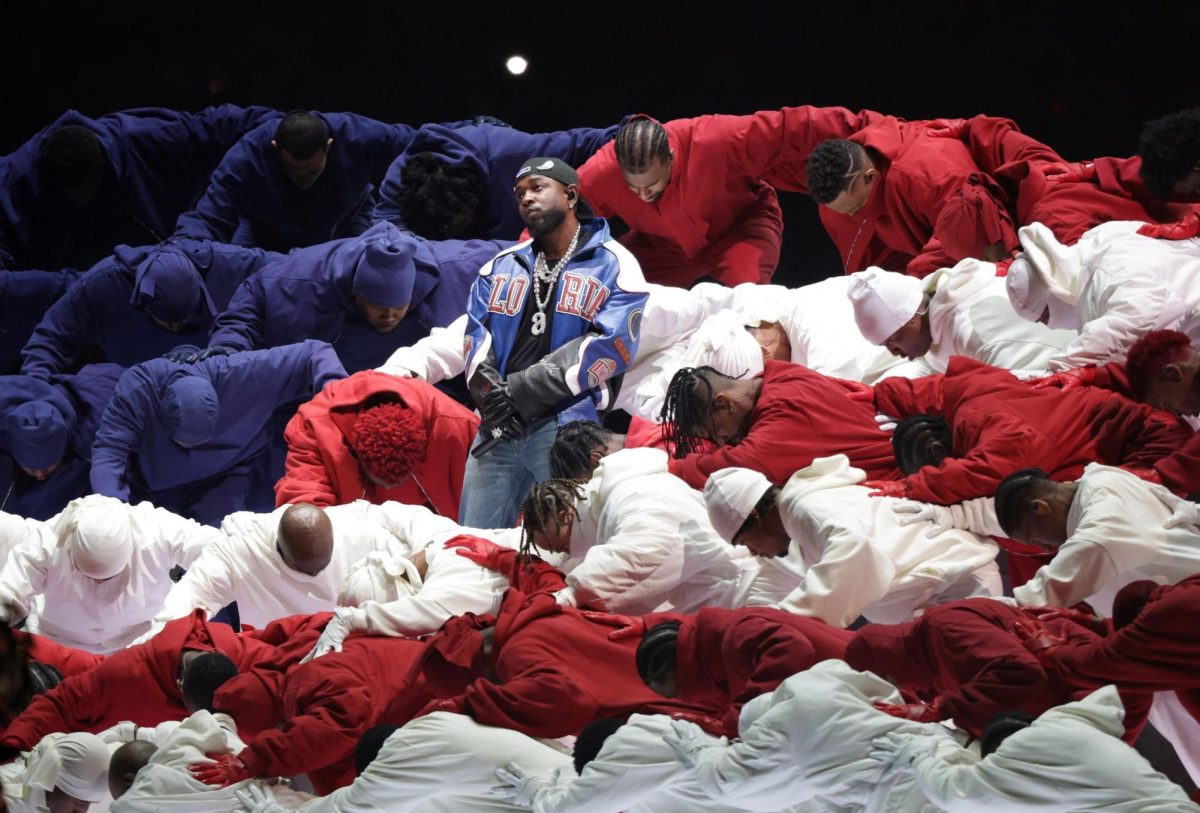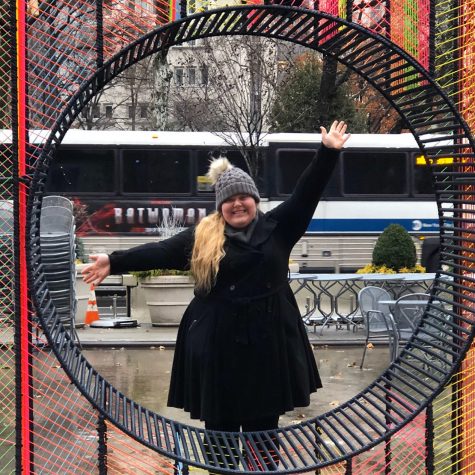
Because of the media coverage of cultural diversity, honors students chose professors to discuss why cultural diversity benefits academic successes and the contributions it holds at the 11th annual Redwine Honors Symposium on March 25.
Students chose Salim Azzouz, associate engineering professor, Jeff Hood, associate professor of math, and Magaly Rincón-Zachary, biology professor because of their diverse background and experience with a variety of cultures.
Both Azzouz and Rincón-Zachary are naturalized American citizens and spoke about their travels across the world that led them to Wichita Falls, Texas.
Hood, on the other hand as a Texas native grew up less than a half hour away from the Mexican border and said he welcomed diversity into his life early on.
According to Hood, he couldn’t “get enough” of the cultural influences he experienced as a child and wanted to learn everything about other cultures.
“I come from a fairly homogenous background where my family is almost entirely Scottish,” Hood said. “While I am very hubris about my culture, I’m also able to take that hat off and put it on a shelf to accept whatever else is around me culturally like a blank slate.”
While he grew up with a Scottish family, his childhood was spent in a small town in south Texas just 30-minutes away from the Mexican boarder where about 80 percent of the population was Mexican. Hood said he “very clearly remember asking, ‘Why do they have quinceañeras and we don’t?’”
From that first acknowledgment, Hood said he noticed a sharp contrast in cultures of people even within the same town, and took a “divergent path” from continuing the separation and instead gravitated towards new cultures and experiences.
Fascinated by similarities and stark differences each culture has, Hood began to experience cultures not only through interactions but through food, music and simply asking questions to those around him.
“I’ve been in academia for 22 years, and the higher up I got, the more I got to interact with people from other countries,” Hood said.
Rincón-Zachary said she has also had many “eye opening experiences” along with her students that have “been impacted for the rest of their lives,” yet the challenge in appreciating those experience lies in inclusion.
“After teaching for many years, I decided to become a naturalized citizen because I wanted to be heard, and I wanted to vote. The challenge to be a naturalized citizen here is appreciating the diversity the university offers because we have students from every where,” Rincón-Zachary said. “The challenges are more evident today than ever before because of the toxic environment President Trump and his allies have created. I think we need to be cognizant of that and do something with that.”
Rincón-Zachary said she stresses the importance of engaging with different cultures because as she learned more about the varying cultures around her, she also gained an appreciation for her own Venezuelan culture she grew desensitized to since she was surrounded by it.
“I became more aware of my own identity because I was exposed to other cultures and I wanted to know who I am,” she said. “It’s a comfort to know who I am, and I learned to love my country and how rich and beautiful it is.”
More than anything, Azzouz said common goals bond people, and to learn about personal identity, people most reach beyond their comfort zones and seek out relationships unlike those familiar to themselves.
“The number one thing that keeps people away from one another is thinking you don’t have anything in common,” Azzouz said. “If you seek to find someone, even to help with a homework problem, you build those relationships that produce friendships.”
But as relationships with other countries grow more hostile it seems, Hood said it’s a matter of empathy for people to care about one another despite differences that drive wedges between cultures.
When Hood went to graduate school, he had one adviser from Russia whose wife was a Russian Jew, and because the attitude of Russia was that Jews were non-citizens, Hood’s adviser and his wife had to get smuggled out of the country for safety.
Hood said the interactions were so profound to him because growing up, the Russians were the enemies to be hated. Schools drilled into students that the Russians were eventually going to blow up America, and Hood said he found a hero in his Russian adviser; according to Hood, he was someone who was smart and effective enough to teach quantum physics to kindergarteners, if given the chance.
Another of Hood’s advisers was from Ethiopia, and quickly became like a second father to him, Hood said. That adviser came to America right before the Russians went into Ethiopia, and when it was time for him to go back, the country had changed so much that he had to seek political asylum.
“That right there is something that I can understand, but I will never, ever experience,” Hood said. “I could only experience that through the empathy and love for my advisers. My exposure to other cultures became more abstract and I had began to empathize with people rather than sympathize.”
Azzouz, Hood and Rincón-Zachary all said taking the appreciation they have gained over their lives from their interactions demonstrates courage not only on their part, but from all those who have ventured into another culture and sought insight into another culture.
“I am thankful for the cultural diversity I have experienced because it has expanded my horizons and I am very content with that,” Rincón-Zachary said. “I’m pleased to have many colleagues that have similar experiences like me. My experiences with other cultures has made me a better person, and what else can we ask for from ourselves as we get older?”
Home to more than 100,000 residents, Wichita Falls, Texas, contains one-third of the residential population as of non-white hispanic families according to city-data.com, and continues to introduce diversity into the community because of the university campus. With students from over 53 different countries, this campus contains a variety of cultures, religions and backgrounds, and Azzouz, Hood and Rincón-Zachary emphasized the necessity for students to delve into programs that enrich students on various topics.
“I can’t emphasize enough the importance of taking advantage of the opportunity MSU and the honors program offers students with study abroad,” Rincón-Zachary said.
Rincón-Zachary also said the campus has such diverse organizations that offer events that tell a lot about cultures and she said students should take advantage of the opportunities provided to expand their minds to different lifestyles.
According to Paige Inman, early childhood education freshman, the members of campus organizations hold various events that encourage students to participate as well as encourage diversity between cultures, genders and ages despite growing tension throughout the media.
“In a world where equality is a value that holds vast importance, I have found that a lot of conflict comes from intolerance and ignorance of other people’s beliefs,” Inman said. “Knowledge is the best way to try and fix this problem, and the more we know about something the less foreign it becomes. We start to realize that we are a lot more alike than we are different, the better we are able to accept and set aside these differences to work together.”
To combat viewpoints of those seeking to diminish relationships with other countries, Hood said people have to “make themselves available” to growth opportunities to better our society as a whole.
“Don’t wait for those opportunities to come to you, but instead make yourself available to potential new friends,” he said. “Everybody wants to be loved, and everyone want to be respected and appreciated. If we keep those things in mind then we all succeed in life.”

















